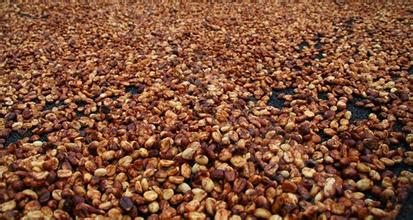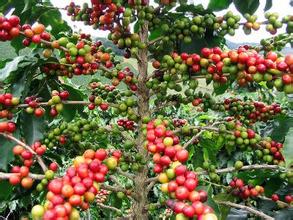African Coffee Manor the Black Gold Story of the "Coffee War" in the Coffee Bean producing area of Kenya
The quality of Kenyan caffeine is widely praised in the global market, known as "black gold" in the industry, but the industry has long been monopolized by Western multinationals. To this end, Kenya wants to attract Chinese and other Asian investors to the market, thus intensifying the business game.
According to a survey released by local media, six western companies currently control about 60% to 70% of the coffee trade in the Kenyan market.
Last year, for example, the "Big six" received about 5.2 billion shillings ($60.5 million) to 5.6 billion shillings ($65.12 million) from the industry. the other 44 traders can only share the remaining less than 3 billion shillings ($34.88 million).
At the top of the list of the "Big six" is the British company TAYLO WINCH, which accounts for 15 per cent of the raw coffee purchasing market, followed by the diamond coffee company with a market share of 12.06 per cent, and the third UK company ARMAJARO with a market share of 10.78 per cent. In addition, there are enterprises from Germany, France and other countries participating in it.
TAYLO WINCH, for example, ships most of its coffee to Sweden, where it is baked, mixed and processed by the local VOLCAFE Coffee Company before being shipped to the United States. In the United States, the coffee is either sold directly or re-sold to other countries. It can be said that TAYLO WINCH and its partners control all aspects from production to sales.
The monopoly position determines that the "Big six" can control the rise and fall of market prices, and their participation in value chains ranging from collecting coffee beans, grinding and trading to roasting, warehousing and logistics makes it difficult for other buyers to enter the local coffee market.
Kenyan coffee farmers are at the bottom of the industry value chain. The price of unprocessed coffee beans was only about 130 shillings ($1.51) per kilogram at its peak, and the middleman who bought the coffee sold it on the exchange for more than twice as much. The market price of processed coffee will rise to 4000 shillings ($46.50).
To break this situation, Kenyan authorities are trying to attract buyers from countries such as China, South Korea, Japan and the United Arab Emirates to participate in the local coffee market in order to achieve a more balanced coffee trade, benefit farmers and increase local taxes.
According to local media reports, major coffee producing areas such as Nieli and Migoli have negotiated agreements with buyers from China. According to the agreement, local coffee farmers will sell coffee directly to Chinese merchants at a price of about 250 shillings ($2.90) per kilogram.
Some people with vested interests have protested against this practice. Two weeks ago, some Western companies warned coffee makers through the media that they would face billions of shillings in losses if they allowed the government's new agreement to be implemented.
"it is clear that government officials lack an understanding of coffee production and trading structure, and the policies introduced by these governments will not only harm the interests of coffee-related practitioners in the country," the company said in a statement. it will also cause chaos in coffee purchases around the world. "
In response, Gachagua, a local official in Nieli County, said that although many vested interests have called on local lawmakers and heads of coffee cooperation agencies to unite against this policy, which can bring real wealth to farmers, he will not give in.
"I know that a lot of money will be used to destroy our efforts to liberate the farmers, and I even realize that some people want to remove the current government in the next election, but this will not stop our efforts," Gachagua said. The bow did not turn back, and we bear the trust of the people. "
Coffee is one of the main sources of foreign exchange in Kenya, and its foreign exchange earning status is second only to tea, horticulture and tourism.
Last year, as global supply increased and international coffee prices continued to fall, Kenyan coffee prices fell to their lowest level since 2007, seriously affecting the livelihoods of millions of coffee farmers. Coffee prices have rebounded since the beginning of this year due to an expected decline in coffee production due to dry weather in Brazil.
Source: platinum Coffee College
Important Notice :
前街咖啡 FrontStreet Coffee has moved to new addredd:
FrontStreet Coffee Address: 315,Donghua East Road,GuangZhou
Tel:020 38364473
- Prev

On the treatment of Coffee beans introduction of Honey treatment of Coffee fruits and its difference from others
A few years ago, a fad of expensive Indonesian Kopi Luwak introduced domestic consumers to the concept of diversified production technologies for boutique coffee, and then the emergence of sparrow shit coffee in Brazil and shit coffee in Thailand was a bit like an odd coffee zoo war. When it comes to the new stars in the production process of boutique coffee, honey treatment has to be mentioned. At the WSC contest, which is known as the Coffee World Cup
- Next

A brief understanding of the varieties of coffee trees, a detailed analysis of the classification of coffee trees.
Different varieties of coffee beans have different tastes, but even the same varieties of coffee trees have their own unique flavor due to the influence of different soil and climate. 1. Arabica Coffee Tree (coffeaarabica) originated from Arabica Coffee Tree in Ethiopia, which accounts for 70% of the world's coffee bean production. The world-famous Lanshan Gaffin and Mo
Related
- What is the meaning of lactic acid fermentation with coffee bean treatment?
- How to judge the state of foam by sound?
- How does the latte pull out the unicorn pattern? Come to get for a little trick to improve the flower pull!
- Will flower pulling affect the taste of the latte?
- Do you know the history of coffee?
- The difference between honey treatment and sun washing what is raisin honey treatment?
- What kind of milk can a novice use to make coffee foam to keep the foam longer? The correct method and skills of milking tutorial sharing
- Why do washed coffee beans taste sour? Flavor characteristics of washed Coffee
- Introduction to the skill of how to practice the size and height of water injection around the circle of hand-brewed coffee
- How do beginners practice coffee flower drawing from scratch?

